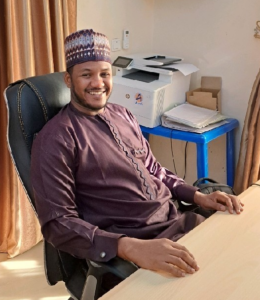Dr. Binta, originally from Guinea, is among the rare women holding fieldwork leadership roles. An expatriate since 2021, she is an assistant medical coordinator in ALIMA’s medical team in Bangui, Central African Republic.

First published November 14, 2024 by ALIMA
With 14 years of experience in humanitarian work, including 12 years with ALIMA, Dr. Binta tells us about her daily life as a woman and a humanitarian, caring for communities in need while being far from her family in Niger.
As part of its field deployment policy, ALIMA actively promotes the application of women for positions of responsibility. However, there are very few women in such positions in the field, particularly open to expatriation.
What was your professional background before ALIMA and within ALIMA?
Before joining ALIMA, I worked for three years as an internist, specializing in infectious diseases in dermatology, during which I defended my doctoral thesis in 2010. Then, I spent four months at the National Institute of Neonatal Care in Conakry, Guinea, focusing on pediatric malnutrition management. During this time, I also collaborated with Médecins sans frontières at Donka University Hospital in Conakry.
In 2010, after marrying my husband, who was stationed in Maradi, Niger, I relocated there and briefly worked with MSF Belgium in Guidam Roumdji in southern Niger before leaving due to pregnancy. After giving birth, I joined ALIMA in 2012, and participated in the very first malnutrition project of the NGO Befen in Mirriah, Niger, serving as a general practitioner until 2014. From 2015 to 2016, I was a doctor in charge of activities at Creni, and from 2016 to 2021, I served as a referring doctor in Mirriah before going abroad to Chad. Currently, I am in the Central African Republic as the deputy medical coordinator for ALIMA.
What has struck you the most in your career at ALIMA
What stands out to me the most is the solidarity. Everywhere I’ve been, whether in Niger, here in the Central African Republic, or in Chad, I’ve never felt like an outsider, I have always got along well with those around me.
Sometimes people find it difficult to work with expats, but I haven’t experienced that. Since I began working abroad and with ALIMA, I have had good relationships with colleagues. There is mutual support and that’s important.
What do you think is the most difficult aspect of humanitarian work?
As a woman, the biggest challenge for me is the distance from my family. This is what comes up most often in my discussions with fellow women humanitarian workers. We tell ourselves that we have to move forward for the sake of our family, but it’s hard for us and our families because our children are growing up.
Sometimes my children call me and ask: “When are you coming back?” “We need this, when will you be home?” “How many days do you have left?”.
That’s what’s hard, but these are challenges that need to be addressed, especially when you want to make a positive impact in the communities we serve. I like to practice, pass on what I have learned, help, and consult patients. I like being in contact with communities.
Working as a doctor is also difficult. You make every effort to stabilize your patient, you tell yourself that they will be fine and will recover. But then, you hear that this patient didn’t make it. That’s very hard.
As a woman, what are the challenges you face on a daily basis?
At first, I didn’t feel it too much, but since I’ve taken on the role of medical coordinator, it has become a challenge. There’s a constant need to prove myself, that I can do it like men. Maybe I’m making it up in my mind, but I’m trying to get through all of that, focusing on finding solutions and ensuring that issues remain within the professional realm. As a manager, you really have to be respected so that things can move forward.
Also, my ability to overcome these challenges comes from growing up surrounded by brothers. I grew up in a male environment and was always competing with my older brother. So, that’s what motivates me when I’m feeling stuck.
What is ALIMA doing to facilitate the work of women within the organization?
ALIMA does a lot to empower women. First of all, the Individual Training Fund initiative (Fonds Individuel de Formation, FIFI) provides financial support, covering up to 75% of training costs for women within the organization. This helps us develop our skills and knowledge. This initiative aims to promote access for ALIMA employees to leadership positions, which are currently underrepresented. When it comes to recruitment, ALIMA also encourages women to apply for positions of responsibility.
I am very happy to work with ALIMA. My journey with the organization has been one of mutual growth—while I have developed personally and professionally, I have witnessed ALIMA’s expansion, now working in 14 countries across three continents.
Related Articles

Mpox Response: Launch of a New Strategic Centre in Goma
A new strategic health center in Goma has been opened by ALIMA to help combat the Mpox epidemic ravaging the Democratic Republic of Congo.

Navigating Haiti’s Health Crisis: ALIMA’s Mobile Clinics Offer Hope Amid Chaos
ALIMA, an international medical NGO, has launched mobile clinics in Port-au-Prince, providing crucial healthcare services to thousands amidst Haiti’s escalating humanitarian crisis. Their efforts offer a lifeline to those cut off from traditional medical facilities.

In the Shadow of Childbirth: The Silent Ravages of Obstetric Fistula in Cameroon’s Far North
In the Far North of Cameroon, obstetric fistula plunges thousands of women into devastating silence and stigmatization. Thanks to ALIMA and its partners, they benefit from free care and social reintegration. Haouat and Josiane have regained their dignity and hope after years of suffering, thanks to reconstructive surgery.
